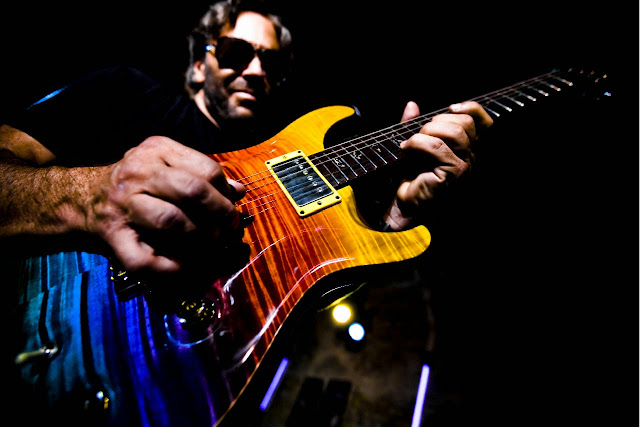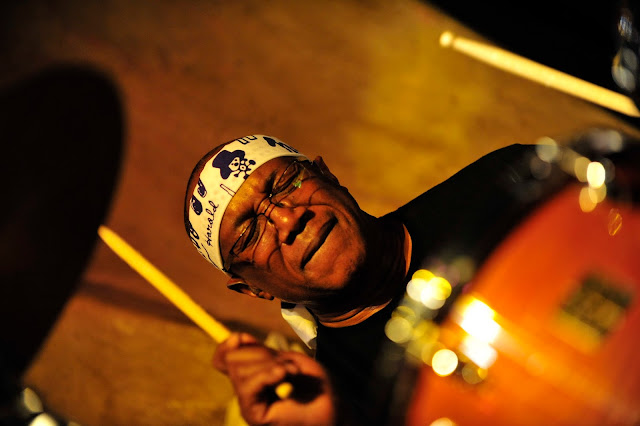 |
| Al Di Meola |
Al Di Meola (born Al Laurence
Dimeola, July 22, 1954 in Jersey City, New Jersey) is an acclaimed American
jazz fusion and Latin jazz guitarist, composer, and record producer of Italian
origin (from Cerreto Sannita). With a musical career that has spanned more than
three decades; he has become respected as one of the most influential
guitarists in jazz to date. Albums such as Friday Night in San Francisco have
earned him both artistic and commercial success with a solid fan base
throughout the world.
"If you don't advance
creatively," Al Di Meola once told Guitar Player's Jim Ferguson,
"then all you have left is playing Vegas." From his stunning arrival
on the scene as the fiery virtuoso in Chick Corea's jazz fusion group Return to
Forever to his international acclaim as the member of an acoustic guitar trio,
to his championing of the musical legacy of tango master Astor Piazzolla,
guitarist Di Meola has held firm to this credo. Passionate, opinionated, and
immensely gifted, he has covered more musical terrain in his 20-year career
than many artists have in a lifetime. Di Meola's accomplishments are made all
the more remarkable by the fact that he has achieved them on both electric and
acoustic instruments. Outwardly the electric guitar might seem similar to its
acoustic counterpart talented performers on the two instruments have emerged
from time to time, but few other artists have shown such a mastery of both or
have been able to use them in such a wide variety of musical contexts.
As a youngster in the New Jersey
town of Bergenfield, some 20 minutes away from New York City, Di Meola's first
musical experience was on drums. However, when he was eight he began taking
lessons from a local guitarist named Robert Aslanian who introduced him to a
wide variety of music. Di Meola's exposure to many different musical
repertories would continue to inform his development as a guitar soloist.In the
early 1970s Di Meola studied instrumental performance at Boston's Berklee
School of Music and performed with keyboardist Barry Miles. It was a call from
keyboardist Chick Corea in 1974, though, that truly set his career in motion.
Corea, who a year earlier had founded a second version of his influential
fusion group Return to Forever, heard tapes of Di Meola performing with Miles's
group and found him a worthy replacement for Bill Connors, who had recently
left the band. After only a few days of rehearsal, Di Meola made his Carnegie
Hall debut with Corea's group, and the following night Return to Forever played
for a crowd of 40,000 in Atlanta.
Over the next two years, Return
to Forever continued to tour successfully and released three albums. When the
group suddenly dissolved in 1976, Di Meola, who had just released his first
solo album, Land of the Midnight Sun, was momentarily disoriented by the
group's disbandment but decided to use the opportunity to pursue a solo career.
Elegant Gypsy followed in 1977, and the album became Di Meola's first major
commercial success, ultimately selling nearly a million copies.With Di Meola's
developing popularity as a soloist came a certain amount of negative press.
Though most writers agreed that Di Meola was a phenomenal technician on his
instrument, a few felt that his pyrotechnics masked a lack of emotional
content. The controversy reached a head when Di Meola first teamed with acoustic
virtuosos John McLaughlin and Paco de Lucia for a world tour and a live album,
recorded in 1981. Though the album, Saturday Night in San Francisco, was hugely
successful and won several awards, Stereo Review critic Joel Vance commented
that the trio was so intent on displaying their virtuosity that "not one
moment of real emotion is allowed; with all the dazzling zip, the result is
sterility."
 |
| Al Di Meola |
"I'm doing the music I like
and it's a great high," Al once said. "I've established a following
and now I want to reach more people." The excitement and challenge of his
music in both acoustic and electric styles is proven with each new project he
takes on, as every performance is, indeed, a tour de force!















